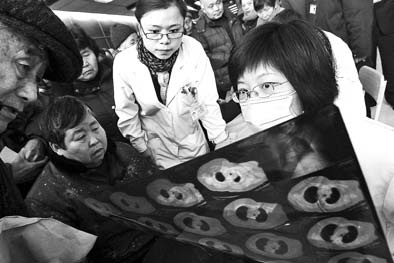Society
Shanghai to reform healthcare
By Wang Hongyi (China Daily)
Updated: 2011-03-17 08:38
 |
Large Medium Small |
|
 Doctors from Shanghai Huadong Hospital offer free medical treatment to villagers in Jiangqiao town in Shanghai on Feb 19. Provided to China Daily |
SHANGHAI -The municipality of Shanghai kicked off a week-long debate on its draft plan to reform its medical and drug system, posting the plan online on Wednesday for public comment.
| ||||
The municipal government will provide basic medical service for the whole population, including the registered population and people who live in the city for more than six months, and will greatly increase its health funding to ease the financial burden on residents.
The draft is on the website of the Shanghai Municipal Health Bureau, and residents have a week to give comments and suggestions.
The plan will be adjusted based on public suggestions and the final version is likely to be issued in mid-April.
"Shanghai is one of the leading cities to carry out healthcare reform. The city has abundant healthcare resources, high-level medical services as well as advanced medical technology," said Xu Jianguang, director of the Shanghai Municipal Health Bureau.
"But the city still faces a lot of urgent problems, which pose great challenges to its development," Xu added.
Faced with a large migrant population, most of whom live in the suburbs, the city should adjust the administration of medical resources to meet the increasing demand, he said.
So far, the city has 34 large top-quality public hospitals, of which 32 are located in downtown areas, leading to an uneven distribution of medical resources.
Under the draft plan, more top-quality public hospitals will be established or renovated on the city's outskirts to balance high-quality medical resources.
Nine top-level hospitals are expected to open in the city's suburbs in 2012, the bureau said.
According to the plan, the city will take measures to deal with the problem of an aging society. More nursing centers, rehabilitation centers and facilities for elderly people will be established.
The city will also carry out a new round of a campaign to strengthen its public health system, including disease prevention, public health education, improvement of maternal and child hygiene, as well as food safety.
"In addition to being an international metropolis, Shanghai is also an important port city, which means a higher risk of importing diseases. This puts huge pressures on the city's public health," Xu said.
Local communities will face more public health service problems, such as screening for diseases among newborns, checking for colorectal cancer among local residents and inoculating pneumonic vaccine for people aged above 60.
Shanghai will train more medical personnel through a standardized program for resident doctors, which requires medical students to have one to three years of residency experience before they can become clinical doctors.
The city was also exploring ways of improving the service of community-level hospitals and establishing the family doctor system. Family doctors will not only be able to offer home visits but also organize remote online consultations.
In addition to the 307 commonly used medicines regulated by the health ministry on its essential drug list, the city added another 381 medicines. All of these drugs will be covered by medical insurance and sold at cost.



